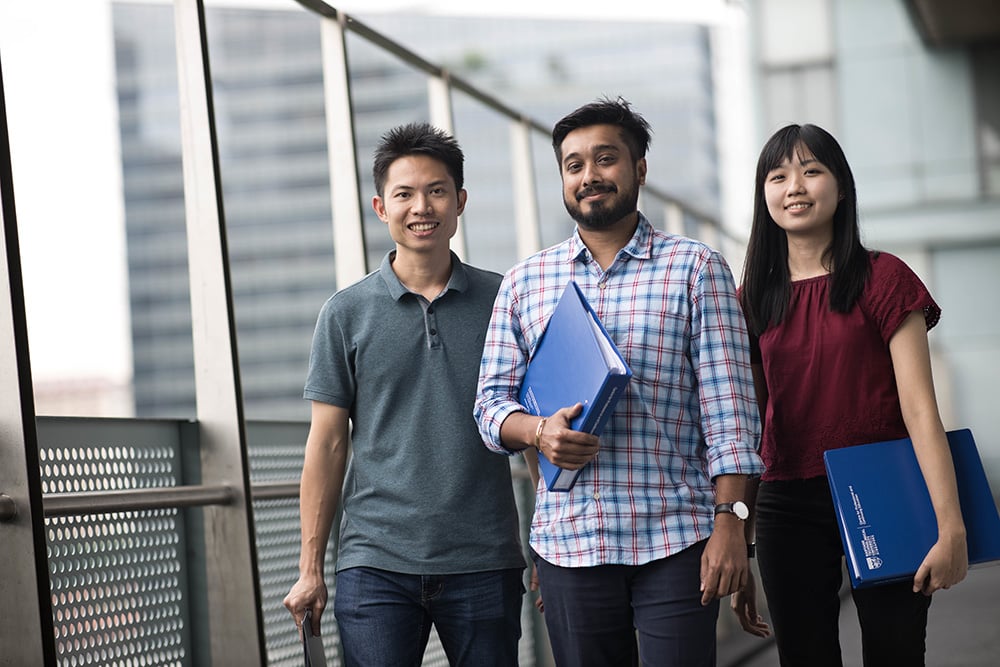Introduction
This course is aimed at trainers of the Code For Fun enrichment programme for primary and secondary schools, and/or those in a similar role, especially those without prior pedagogical training or teaching experience.
In this course, you will learn the fundamentals of managing primary and secondary school students in order to create a conducive environment for effective learning of digital coding and related skills. You will also learn to plan and deliver engaging learning experiences suited to your students' profiles through varied pedagogical stances, strategies, and learning approaches. You will practice what you have learned and be assessed through micro-teaching sessions. You may be deployed as a CFF Trainer upon successfully passing the course.
Course Availability
-
Date(s): 24 Jul 2025 to 01 Aug 2025
Time: 9am - 6pm
Venue: NIE Campus
Registration Closing Date: 03 Jul 2025
Objectives
At the end of the course, learners will:
- Be able to describe and reflect on the fundamentals of teacher professionalism, teacher authority, and their application to classroom practice
- Identify and select appropriate proactive and remedial intervention strategies for classroom management of primary and secondary students
- Identify and select appropriate computing pedagogies and instructional approaches to deliver learning experiences to various student profiles.
- Gain and apply pedagogical content knowledge (PCK) on the teaching of computational thinking, key computing concepts, and digital competencies.
- Practice, critique, and reflect on what they have learned through role play activities.
Outline
Day 1: Pedagogical Fundamentals and Classroom Management
- Course Introduction
- Teacher Professionalism
- Authority bases
- Proactive intervention strategies
- Remedial intervention strategies
- Analysis of classroom scenarios
- Application of strategies to classroom scenarios
- Reflection on the application
Day 2: Pedagogical Content Knowledge (PCK) and Developing Learners’ Digital Competencies
- Introduction to Computing Pedagogies
- PCK of Computing Concepts, Computational Thinking and Problem Solving
- Approaches to Teaching of Visual Programming Languages
- Approaches to Teaching with microcontroller hardware
- Adopting Integrative STEM approaches
- Engaging Learners in Digital Making activities using external modules for microcontrollers (CFF kits) and emerging technologies
- Introduction to and preparation for microteaching
- Lesson planning exercise
Day 3: Microteaching Practice
- Split into two equal groups of 15 learners each with one NIE instructor
- Each learner to plan and enact a short (10-15 minutes) segment of a CFF Lesson to the other learners in the group who will role-play as students. Learners to apply appropriate approaches and instructional skills learned.
- At the end of each microteaching segment, the other learners will provide peer-critique and the instructor will provide formative feedback and guidance (5 minutes).
- Microteaching to be conducted at the rate of 2 to 3 learners per hour.
- Any remaining time at the end of Day 3 can be utilised for generalised feedback and guidance.
Day 4: Microteaching Assessment
- Repeat of microteaching practice session, but with summative assessment of each microteaching performance. Peer and Instructor feedback for further improvement can be provided as needed.
Who should attend
Fees and Funding
Standard Course Fee: S$4,360.00
| SSG Funding Support | Course fee | Course fee payable after SSG funding, if eligible under various schemes |
| BEFORE funding & GST | AFTER funding & 9% GST | |
| Singapore Citizens (SCs) and Permanent Residents (PRs) (Up to 70% funding) | S$4,000.00 | S$1,308.00 |
| Enhanced Training Support for SMEs (ETSS) | S$508.00 | |
| SCs aged ≥ 40 years old SkillsFuture Mid-career Enhanced Subsidy (MCES) (Up to 90% funding) |
- Standard course fee is inclusive of GST.
- NTU/NIE alumni may utilise their $1,600 Alumni Course Credits. Click here for more information.
Trainers

Dr Tan Ter Ming Timothy
Timothy is a Council Member of the Singapore Association for the Advancement of Science (SAAS), and a member of the American Educational Research Association (AERA), European Science Education Research Association (ESERA), Australian Science Education Research Association (ASERA), International Technology and Engineering Educators Association (ITEEA), and The Singapore Institute of Biology (SIBiol). He has been on the Organising Committee for the International Science Education Conference (ISEC), Singapore (2006, 2009, 2014, 2018, 2021), Organising Committee of the International Biology Olympiad held in Singapore (2012), as well as past Editor of the SIBiol Bulletin (2007-2010), past Honorary Treasurer (2003-2006), Council Member (2006-2013) of SIBiol.

Assoc Prof Choy Doris
Dr Doris Choy is an Associate Professor in the Learning Sciences and Assessment Academic Group, National Institute of Education, Nanyang Technological University. Dr. Choy earned her B.S. and M.S. degrees in Hospitality and Tourism Management at Purdue University and her Ph.D. in Educational Technology, Curriculum and Instructional at Purdue University.
Her research interests include technology enhanced learning, technological pedagogical content knowledge, teacher education, adult learning and instructional design. She has published in journals such as Learning and Individual Differences, Journal of Research on Technology in Education, etc.
She teaches instructional design and technology, training methods and strategies, blended learning at the graduate and continuing education level. She serves as the Programme Leader of the Master of Arts in Professional Education (Training and Development). She teaches technology for meaningful learning, classroom management at the undergraduate and post-graduate diploma levels. NIE awarded her Excellence in Teaching Commendation in 2017 and 2019.
More information can be found at this link: https://dr.ntu.edu.sg/cris/rp/rp01483

Asst Prof Edwin Chng
Edwin’s current research interest lies in the extraction of relevant student information from classrooms to support evidence-based intervention strategies. As such, he works primarily in the fields of multimodal learning analytics, educational data mining, and artificial intelligence (AI) in education. With the use of student pose and gaze data, Edwin has studied how students collaborate and how teachers facilitate in open-ended learning environments such as makerspaces. With the use of computer vision, Edwin has examined the deployment of AI agents to support science teachers with informed pedagogical and technological considerations. Overall, Edwin is interested in the educated use of technological innovations to augment teaching and learning in traditional classrooms.
Academic Background
- PhD in Education, Harvard University (USA)
- MSc in Computational Science and Engineering, Harvard University (USA)
- Postgraduate Diploma in Education, National Institute of Education (Singapore)
- MASt in Applied Mathematics, University of Cambridge (UK)
- BSc in Physics with Theoretical Physics, Imperial College London (UK)

Dr Seow Sen Kee, Peter

Mr Ng Yong Sim
Prior to joining NIE/NTU, Yong Sim was with the Ministry of Education (Singapore) where he taught in secondary schools between 2004 to 2015. Yong Sim held the position of Senior Teacher and has experience in mentoring teachers. He is committed to work involving Design & Technology (D&T) education in the secondary schools and shared his professional practices to many D&T teachers in numerous D&T sharing platforms.






